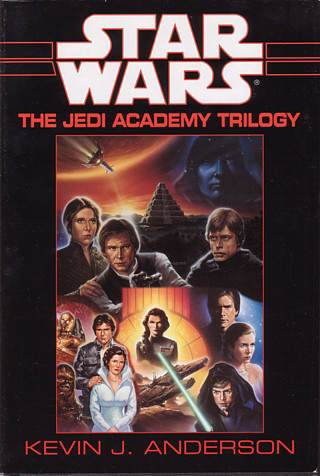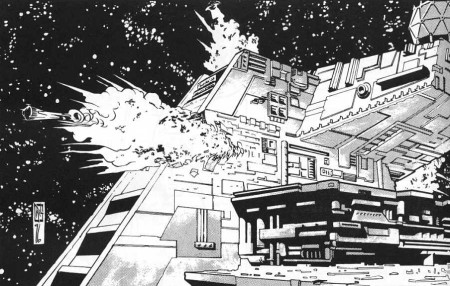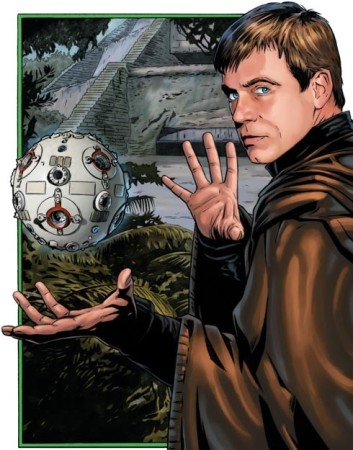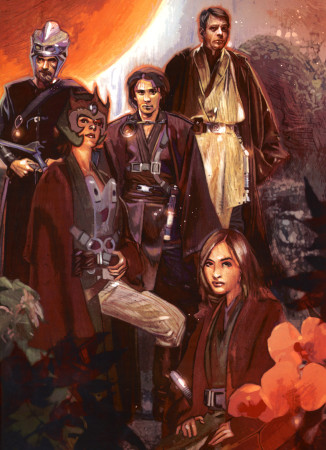 For the latest piece in our Fatal Faves series, Megan Crouse of This Blog is Full of Words/HoloNet Digest and I got together to talk about the Jedi Academy trilogy! We both have fond memories of this much-maligned trilogy from our younger days, and we revisited them together. With much laughter, mocking, and nostalgia, here’s our conversation!
For the latest piece in our Fatal Faves series, Megan Crouse of This Blog is Full of Words/HoloNet Digest and I got together to talk about the Jedi Academy trilogy! We both have fond memories of this much-maligned trilogy from our younger days, and we revisited them together. With much laughter, mocking, and nostalgia, here’s our conversation!
Megan: So I think maybe the first thing to discuss is whether the series even holds up – obviously we’re doing this because we’ll defend it, but would you recommend it to a fan who has maybe never read Expanded Universe material before?
Rocky: Hmm. I’d say probably not. I got into the EU due to JAT, but I also wasn’t super familiar with Star Wars before then, and didn’t know what other Star Wars books were out there. I think one of the reasons this series holds up for me is because when I first read it, I didn’t have a point of reference. But for most people, who have had at least some exposure to Star Wars? Probably not.
Megan: That’s funny that you say that, since it was one of my first exposures to the EU too. Reading it after seeing the sequel trilogy makes me realize how many parallels there are – Luke’s fears about his own power (which isn’t directly confirmed in the ST but could be a factor in his exile), Mon Mothma’s illness, Han being a father figure to a dark-haired ball of rage. That said, the corny moments are very corny and the awkward moments are very awkward (…everything, everything about Moruth Doole) so it might be a better introduction thematically than tonally?
Rocky: Yes. If I’m trying to explain the Legends-verse to someone, I’m going to encourage them to read the older Bantam stuff. Yes, with a disclaimer that a lot of it is very silly and doesn’t make a ton of sense in the longer run, but I still think it’s important! A lot of the tone and theme carries through well. Leia’s trying to be a politician without it completely sucking up every last moment of her free time. Luke has lots of concerns about being the first of the new Jedi and feeling very responsible for them even though he doesn’t really know how to train Jedi. Han and Leia’s parenting attempts are… well, their hearts are in the right place even if their actions aren’t always. All of the side characters, some of whom become important, some of whom could easily have been left out. These little touches are the things that do hold up, even if plot and writing wise, the trilogy doesn’t.
Megan: Let’s talk about Luke. Despite spending a portion of the trilogy unconscious, he is the headliner. Kevin J. Anderson writes perhaps my favorite Luke: powerful but humble, not always sure of what he’s doing, but with a sort of accidental grace that comes from being a Jedi. I remembered very well the scene where he walks through a field of geysers and impresses some colonists, because I thought it was cool, but I’d forgotten that he did it by accident. He walks into this scalding steam and just realizes his mistake, puts his hood up, and keeps going. There’s a sort of stubborn heroism there but also an idea that the world just sort of bends around you as a Jedi that I always found very impressive and very clearly illustrated.
Rocky: And I love how Luke is so untrained still and has been through so much. It’s not like he’s very confident about his abilities, but he also understands the legend of the Jedi and how much appearances matter for him. He knows he has to keep his image up as a Jedi, and it really does inspire other people to follow him. He’s trying so hard and I think that matters a lot! It’s not an over-ambitious sort of trying, it’s just feeling a duty to reestablish the Jedi even when Luke’s not sure he’s the right one to do it or is ready.
 Megan: I was surprised that Luke’s powers don’t extend to the dark side within the very temple that he makes his academy; the quickness of the scenes where Gantoris and Kyp agree to be taught by Exar Kun make it seem like Luke is missing a blatantly evil force ghosting around right under his nose. But I see that more as a product of the writing than something to critique about Luke’s character; the senate scenes, including the one where the Jedi Academy is given the OK in the first place, are also very short.
Megan: I was surprised that Luke’s powers don’t extend to the dark side within the very temple that he makes his academy; the quickness of the scenes where Gantoris and Kyp agree to be taught by Exar Kun make it seem like Luke is missing a blatantly evil force ghosting around right under his nose. But I see that more as a product of the writing than something to critique about Luke’s character; the senate scenes, including the one where the Jedi Academy is given the OK in the first place, are also very short.
Rocky: Yeah. That seems more like a writing thing than anything else. In general, I feel like weak writing is the biggest problem of this whole trilogy! There are so many good ideas, good characters and themes, that could have been very well-used. But because of the way some of those characters were introduced, it just didn’t work out.
Megan: I thought Leia in particular was a victim of that, but maybe that’s because I had trouble latching on to Ackbar’s plot – his story seemed tangential, and Leia was used well in the senate but was a bit buried by Ackbar’s plot. I remember liking the Vors better when I was younger. The relationship between Leia and Mon Mothma was good, though: Leia respected Mon Mothma while not fully understanding how she could remain so calm. And while the senate scenes were short, they did what they needed to do, and were a good lesson in keeping a story moving.
Rocky: I really wish I could’ve been more interested in the politics side of this trilogy. There was a lot of potential there, but a lot of it just didn’t seem as interesting as I was hoping it would be. Then again, I didn’t expect to end up liking the Jedi Academy’s adventures while Luke was unconscious! I felt like it made for a good standalone story, but then when similar horrible threats to the Jedi were a more common thing, it was suddenly a much less appealing plot. Also, I wish that there had been more knowledge at the time of JAT about different dark siders and generally more fleshed out Sith lore. I’d love a reimagining of some of the Exar Kun stuff with what we now know about the Sith!
Megan: That’s interesting – when I was young I actually really liked the self-contained Sith lore, and that (nostalgic) feeling has remained. There was a sense of completeness to Exar Kun’s story even though it wasn’t … complete. He was on Yavin IV because he had enslaved the Massassi there; he could astral project through the temples because he had built them using the dark side. (A quick aside: this book’s casual treatment of slavery is … not great. Is Dack the consort okay?) With Exar Kun’s story I could believe that all Sith temples were made of black obsidian and placed in lakes, that all Sith had the ability to live after death, that all Sith built ziggurats. It wasn’t quite canonical, but it was internally consistent?
Rocky: It was. And it did give the Sith a really cool aesthetic, and made them seem pretty awesome to an angsty pre-teen. This series was good at making it seem like they had enough Jedi and Sith lore to work off of, even if they really didn’t just yet. Honestly, the treatment of the Force is something that did hold up well.
 Megan: Exar Kun had a ridiculously good aesthetic, really. You mentioned before that the politics didn’t really grab you. This series set up a lot about the relationship between the Republic and the Empire, including the cartoonish Ambassador Furgan and one of my faves, Admiral Daala. What did you think of them?
Megan: Exar Kun had a ridiculously good aesthetic, really. You mentioned before that the politics didn’t really grab you. This series set up a lot about the relationship between the Republic and the Empire, including the cartoonish Ambassador Furgan and one of my faves, Admiral Daala. What did you think of them?
Rocky: Ohhhh boy! I was wondering when we’d get to this part. So. I absolutely love Daala. I am also endlessly angry about how she was treated in canon, and I wonder a lot: if she’d been introduced in a different book, would she have had a better chance? It seemed like she was trying to be set up as the next Thrawn in this series, but it was quickly clear that she was just hell-bent on destruction and a rather dangerous loose cannon. She was not written well, and that just frustrates me! I get the impression she’s supposed to be as awesome and terrifying as Isard, but never really got the chance to show that off. Though on a less ranty note, I did like how the Imperial-Republic politics were set up, in retrospect. Mostly because it brought up the common things we’d see in the rest of the Bantam EU- the Empire loses territory, splintering into lots of warlords, the Empire being much weakened but still a dangerous threat. The way that conflict is handled is something I do like a lot; the memory of the Empire is still very fresh in everyone’s minds, and therefore they are more likely to take it seriously when new Imperials pop up. It’s a good way to let the Empire slowly decay while getting a chance to go out with a bang.
Megan: Daala was definitely a victim of her own story; right about when she began to develop some deeper characterization – like Sloane, she learns what was and was not helpful about Tarkin’s teachings – Daala goes a bit trigger-happy. Her vision of strafing Coruscant was striking but mostly served to prove how hotheaded she was, how willing to dive straight into potentially disastrous situations. I like that about her, but it makes her simpler instead of more complex as this particular series goes on. The degree to which her story leans on Tarkin’s is a bit tiresome; retroactively giving the Grand Moff a lover always seemed odd to me, especially now when the new EU displays a more female-friendly Empire. But Daala is a pretty enjoyable villain regardless. She’s essentially fighting a battle she can’t win, and which she should have really been fighting nine years ago. She doesn’t get progressively more intimidating, though; her hotheadedness simply becomes a plot point. One thing this series does completely pass over is the reaction of the average citizen to the goings-on; we don’t know what the people of Coruscant think of the Senate, and many of Furgan’s troopers are almost brainwashed. This series sets up the politicking in the later ones without going nearly as far into the human element. I’m reminded of the New Jedi Order’s lengthy senate scenes. Instead, the Republic is good and is under attack by a sleeper agent, and the Empire is bad and equipped with superweapon after superweapon. (I had forgotten that, in this era, we have not only the Sun Crusher and the Darksaber, but also a prototype Death Star.) The pulpiness works, though; all the pieces of the story come together at the end in true Star Wars fashion, the Jedi are pure, the Republic is rattled, and Daala is ready to fight.
Rocky: The pulpiness, the pure black and white, are some of the things I love so much. It’s a good story, and especially thinking about this from when I was eleven, this was absolutely perfect for an eleven-year old! I think it’s also why as an adult, the things that hold up the best are when I place this series in its proper spot in-universe. Things are so much more black and white and there’s so much more room for big conflict, things exploding, ridiculous superweapons, and plot points that just don’t make any sense at all in the longer run. But oh, in retrospect, I’m rather angry that Daala and Tarkin’s relationship really did dampen her character a lot. Especially after meeting Sloane, it feels like Daala could have been Tarkin’s lover without having it be the  centerpoint of her career. She could easily have risen on her merits, even if it might have been unusual for someone like her to make it all the way to Admiral. And along the way, she happens to be involved with someone who’s important in the Empire. I just wish so much of her plot hadn’t hinged on something so stupid, in retrospect. I wanted her to be a good Thrawn-style villain, and it felt like that was more of what the series wanted, but the execution was just so poor. I wanted her to get to kick serious ass and look good while doing it, rather than hotheaded and impulsive (the sort of traits that you’d think wouldn’t have been liked in any admiral). I have all the Feelings about Daala, but that’s also probably because she was one of the more formative villain characters of my early Star Wars years.
centerpoint of her career. She could easily have risen on her merits, even if it might have been unusual for someone like her to make it all the way to Admiral. And along the way, she happens to be involved with someone who’s important in the Empire. I just wish so much of her plot hadn’t hinged on something so stupid, in retrospect. I wanted her to be a good Thrawn-style villain, and it felt like that was more of what the series wanted, but the execution was just so poor. I wanted her to get to kick serious ass and look good while doing it, rather than hotheaded and impulsive (the sort of traits that you’d think wouldn’t have been liked in any admiral). I have all the Feelings about Daala, but that’s also probably because she was one of the more formative villain characters of my early Star Wars years.
I do also wonder about the ordinary people. We know that Coruscant’s kind of a blasted-apart war zone in places, thanks to the World Devastators and all of the ongoing fighting that had liberated Coruscant in the first place. We didn’t see a ton of the civilians’ reaction to all of this, or whether they even knew about it!
Megan: The pulpy grandiosity of these books definitely worked well for me partly due to age – I think I was a bit older when I read them, maybe 13. They’re full of characters with big motives doing big things – Kyp taking the Sun Crusher to avenge his brother, Daala taking her devastating, deteriorating fleet to avenge the Empire, Qwi Xux (I hardly talked about Qwi Xux!) making up for the horrors she made while she steadfastly denied them. Luke fulfilled the promise he made when he threw down his lightsaber in Return of the Jedi, and that’s why this trilogy will always be one of my favorites, even though I might not recommend it to an adult reader new to Star Wars.
Rocky: Yes, I think being eleven is one of the big reasons I love this trilogy. I’d definitely recommend it to a pre-teen who wants to get more Star Wars and likes this style of adventure, and come to think of it, I’ve seen this series often filed in the young adult section. It’s a good story for what it is, and I think a lot of the “haters” don’t think a lot about how this story sounds to someone new to Star Wars, young, and looking for adventure and explosions and pretty clear-cut good and evil.

One of my personal favorite EU novels is Stackpole’s I, Jedi – which does some interesting things to dovetail with KJA’s JAT. What do you guys think of this novel?
I love the JAT, both of you, and also this post.